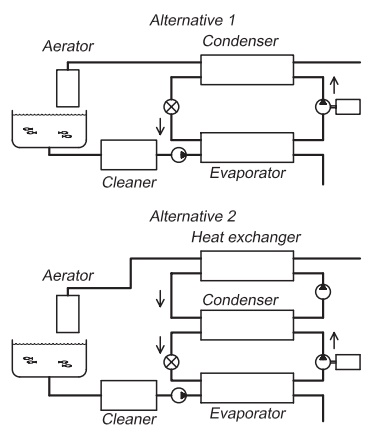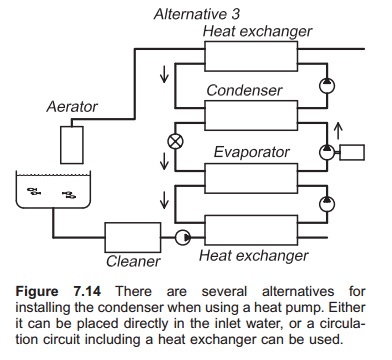Chapter: Aquaculture Engineering : Heating and Cooling
Installations of heat pumps - Aquaculture Engineering
Installations of
heat pumps
When installing a heat pump location of the condenser is
very important, because it is here that the energy is released. For a
refrigeration plant location of the evaporator will be important because here
removal of energy occurs. There are a number of places for installing the
condenser in the heat pump in a fish farm; all have advantages and disadvantages
(Fig. 7.14). One solution is to place it directly into the inlet water, which
gives very good heat transfer. However, leakage from the condenser could lead
to contamination of the inlet water by the refrigerant, which is dangerous
because it could be toxic to the fish. To avoid this, an extra closed circuit
is more commonly used between the con-denser and the inlet water consisting of
a pump and a heat exchanger through which a non-toxic liquid (water or glycol,
for instance) circulates. Glycol has a high thermal capacity so is a good
choice of medium. Between 10 and 15% reduction in the COP is normal when using
the extra circuit, because the heat is transferred twice.
Another method is to install the condenser in the outlet
water and afterwards have a heat exchanger between the outlet water and the
inlet water, also a two-step heat transfer process. The disadvantage with this
method is that increased fouling will present problems. Cleaning of the
condenser, which is normally of the shell and tube type, is difficult.


The evaporator is normally placed in the outlet water.
Here there will also be problems with fouling, and a closed circuit can also be
used to advantage in this situation. A plate exchanger is used in this circuit
to transfer the heat, because it is easier to open for cleaning.
When using the evaporator in the outlet water and the
temperatures are low freezing of the outlet water may be a problem because the
temperature is reduced as much as possible through the evapo-rator to recover
the stored energy in the outlet water, meaning that the temperature in the
working medium is 0°C or less to ensure effective heat transfer.
It is therefore possible that the water in the evaporator
will freeze, for instance if there is a reduction in the water flow or drop in
the inlet water temperature. To avoid breakage of a shell and tube evaporator
due to ice, it is normal to use glycol which functions in the same way here as
in the con-denser circuit; glycol is a liquid with a very low freezing point.
In practice, there is not usually enough energy in the
outlet water to get a heat pump to function with a good COP. Therefore the heat
pump will usually be an integral part of a total energy system where additional
energy from seawater or another low temperature source may be used. Energy may
also be added directly, for instance by using an immer-sion heater; this will
of course require a much smaller heater compared to using an immersion heater
alone and not in combination with a heat pump.
Example
Inlet water to a
fish farm is heated from 2 to 8°C by transfer of energy from the condenser. The
water flow is 500 l/min (8.33 kg/s). Fifty kW of electric energy is supplied to the compressor. Find the
COP for the heat pump.
Start by calculating
the total energy input to the inlet water:
P = mcpdt
= 8.33 kg/s × 4.2 kJ/(kg °C) × 6°C
=210 kJ/s
210 kW
The COP is
therefore
e = 210/50 = 4.2
This means that for
every kW of electric energy that is supplied to the compressor, the water is
heated by 4.2 kW.
Related Topics